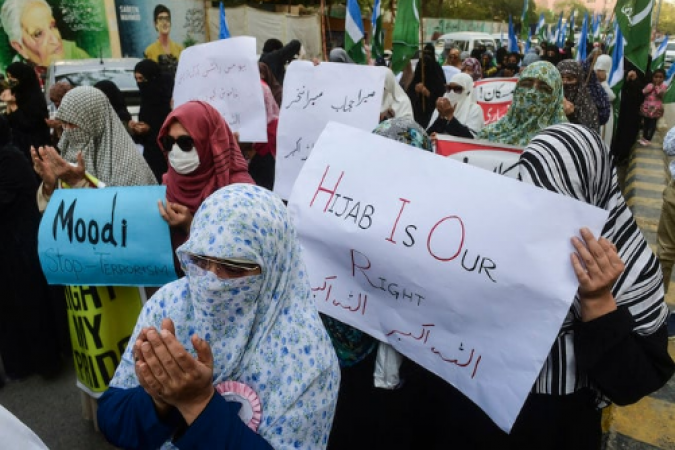
London: Hijab-wearing Muslim women are increasingly subjected to discrimination in daily life as a result of hijabophobia, which is at an all-time high "due to the current political climate," according to the World Hijab Day organisers.
In some parts of the world, laws are being passed that forbid hijabi women from participating in society, according to WHD, who spoke to Arab News. "Muslim women are being pressured to take off their hijab to'show solidarity' and make political statements," WHD said.
On World Hijab Day, February 1, it urged women of all backgrounds to "take a stand against hijabophobia by donning a headscarf" in order to promote awareness of the Muslim custom and women's rights.
Also Read: Unless the world intervenes UN experts foresees a new Rohingya genocide
#UnapologeticHijabi, the organization's chosen theme for World Hijab Day 2023, is "bolder and stronger than ever before: Muslim women proudly donning the hijab."
The hijab is used to excuse discrimination and abuse against Muslim women because of the current social climate, which portrays them as oppressed, submissive, and backward.
This might result in a lack of empathy and understanding for Muslim women, which would make it more difficult for them to participate fully in society and take advantage of opportunities.
According to WHD, it can be difficult for women who choose to cover their heads, whether out of modesty or religious observance, to fit in at school and at work.
The organisation stated that there "might be some instances of religious discrimination, or a lack of understanding and acceptance of the hijab."
"In schools, some hijabi students may face discrimination or harassment from classmates or teachers, or be barred from getting an education altogether," it continued. "Such is the case in Karnataka, India."
Also Read: Philippines will grant the US greater access to military bases
This was a reference to a ruling by the Karnataka High Court from February of last year that forbade thousands of Muslim girls from wearing religious attire to school.
WHD provided examples of bias in the hiring process as well as workplace discrimination it claimed hijab-wearing women experience.
According to experimental studies, Muslim women who wear the hijab in the West have on average a 40% lower chance of being hired and subsequently earning a living than Muslim women who do not wear the hijab.
For instance, a 2022 study found that in the Netherlands, nearly 70% of job applications with a picture of a woman in a bikini received a favourable callback for positions requiring significant customer contact. However, only 35% of applications with photos of applicants wearing hijabs were approved.
Nazma Khan, a Bangladeshi-American woman who founded WHD in 2013, stated that Muslim women in European nations are more likely to experience hijabophobia in public spaces and the labour market.
It specifically cited a study from the Pew Research Center, a US-based think tank, from December 2020 that discovered: "Women in 56 countries experienced social hostilities, that is, harassment from individuals or groups, due to clothing that was considered to violate religious or secular dress norms, according to the sources analysed for a recent Pew Research Center study of 198 nations.
In 42 of the 56 countries where sources claimed that social harassment occurred between 2016 and 2018, women were allegedly targeted for disobeying secular dress codes, such as by donning a hijab or other religious attire.
The World Hijab Day itself, which aims to "promote integration and acceptance of hijabi women in these settings," was cited as saying that "while there are challenges to the integration of hijabi women in schools and the workplace, there have also been efforts to promote understanding and acceptance of hijabi women in these settings."
The group, which marked its tenth anniversary this year, predicted that thousands of people would observe World Hijab Day in more than 150 nations in 2023, including the UK, Japan, Korea, and Switzerland.
Most notably, it continued, "we see an increasing number of non-Muslims participating in wearing the hijab on February 1." Many of them open up to us about their experiences, which, in our opinion, encourages others to learn more about the hijab.
Two-thirds of past participants reported positive experiences that changed their views on donning the headscarf, according to WHD, which claimed that efforts to raise awareness through its movement have helped to change views on the hijab around the world.
The organisation stated that its goals for this year were to "welcome those with curiosity and misunderstandings to an open forum and place to ask questions," increase awareness, broaden its platform, and boost the self-assurance of women who wear the hijab.
Also Read: Boeing bids farewell to an icon by delivering the final 747 jumbo jet
WHD is also a fundraising event, and this year's proceeds will be used to fund diversity and inclusion workshops on Muslim culture for schools, the group said, in an effort to support a safe and healthy learning environment for Muslim students.